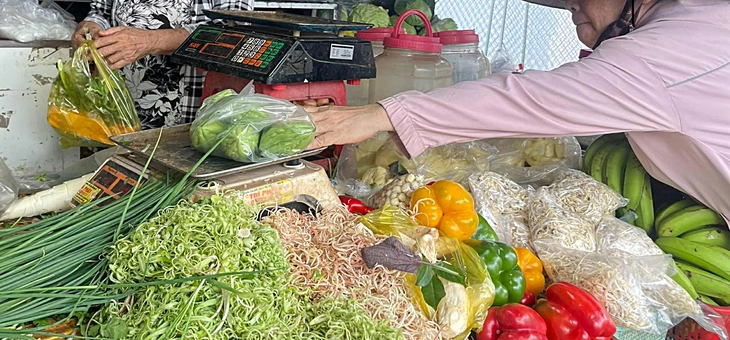
From prices to chemically soaked bananas, consumers need to be wary of products with cheap prices and overly perfect, eye-catching appearances - Photo: XUAN MAI
Although banned from use in food processing, chemicals such as borax and bleach are still secretly used by many establishments and individuals in processing sausages, marinating seafood, soaking banana flowers...
These are familiar dishes in the daily meals of Vietnamese people. What happens to the body when eating food soaked in chemicals for a long time?
Feel free to mix in borax to create toughness and crispiness.
The Ministry of Health has strict regulations prohibiting many types of substances used in food processing because they are harmful to people's health. However, recently, authorities have continuously discovered many production and business establishments using borax (sodium borate) and bleach in the process of preparing and processing food.
Not only did authorities mix borax and bleach into banana flowers (also known as banana hearts), not long ago, they also seized hundreds of kilograms of finished beef sausage, pork sausage, and pork skin sausage containing borax.
Speaking to Tuoi Tre, Mr. Nguyen Duy Thinh, former lecturer at the Institute of Technology and Food ( Hanoi University of Science and Technology), said that borax is only allowed to be used in industry, not in food, but in reality it has been abused for a long time.
Borax is often mixed into sausages to create toughness and prolong the shelf life. Because borax has the ability to bind starch particles, it is often used in vermicelli, noodles, instant noodles... to make the noodles tougher, longer and less likely to break or burst.
Borax is also often mixed in rice cakes, rice cakes... to make the cakes more flexible and not crumbly. In banana flowers, borax is used to bleach, increase crispness, and prolong shelf life because banana flowers are prone to leaking sap and turning black when cut.
Silent poisoning, causing damage to many organs
Associate Professor Duy Thinh said that in the current situation of food production and processing, not only borax but also many other chemicals are used indiscriminately in meat, fish, vegetables, fruits, drinking water..., causing people to be poisoned by many things at the same time. These toxins often seep into the body slowly, causing chronic poisoning.
"Unlike acute poisoning, chronic poisoning is a poisoning that occurs silently, when the body gradually accumulates toxins. By the time the disease develops, it is often too late and it is difficult to determine the cause because the patient has eaten all kinds of things for a long time. This is the danger of chronic poisoning," Mr. Duy Thinh explained.
According to Dr. Tran Trong Nhan, deputy head of the nutrition department at People's Hospital 115, borax, once it enters the body, will not be eliminated but will accumulate in the tissues, possibly causing chronic poisoning. It affects the digestive system, causing loss of appetite, weight loss, and physical weakness. More seriously, it can cause damage to the liver, kidneys, and central nervous system.
Similarly, alum is also a substance that is allowed in food in controlled doses. However, excessive use of alum over a long period of time can increase the amount of aluminum accumulated in the body.
Excess aluminum can affect the nervous system, causing memory loss, behavioral disorders, and may be linked to neurodegenerative diseases such as Alzheimer's. It can also affect the absorption of several other essential minerals.
According to Dr. Nhan, the group of people most vulnerable to the effects of foods "soaked" with chemicals are children, because their immune systems and organs are not yet fully developed, so their ability to eliminate chemicals is poor, making them more susceptible to serious effects, with a risk of nerve damage and delayed development.
Next, the elderly will be affected by liver and kidney function decline, the ability to eliminate toxins is poor, so it is easy to accumulate chemicals, chronic symptoms appear. People with underlying diseases such as liver, kidney, gastrointestinal disease, asthma or other chronic diseases may have a weakened health condition, making the body more sensitive to chemicals and aggravating existing diseases.
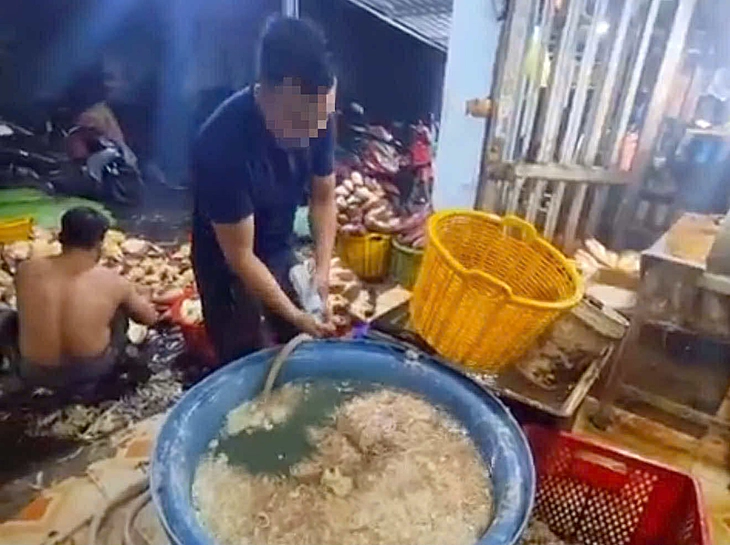
Employees of a banana stem processing facility in Ben Luc residential area (Binh Dong ward, Ho Chi Minh City) re-practice the process of mixing chemicals into the water used to soak banana stems - Photo: Provided by the police
Beware of eye-catching foods
Mr. Duy Thinh said that when many banned substances in food are still widely sold for industrial purposes, it poses a challenge in controlling people's misuse. Therefore, continuous propaganda and education for people, along with the active participation of authorities and the media, is necessary to protect public health.
It is inevitable that food containing chemicals is smuggled into the market and into our daily meals. It is quite difficult to recognize food containing chemicals by senses (eyes, nose, hands), especially with chemicals that do not cause a distinct smell or color.
Doctor Nhan noted that there are some suspicious signs that consumers can pay attention to: food color is too white, unusual crispness, strange smell... Consumers need to be wary of products that are too cheap, have a perfect appearance, and are unusually eye-catching.
Please notify the authorities immediately if you discover dirty food.
Experts and doctors recommend that consumers need to understand information about toxic chemicals in food and how to recognize them so that they can make smart choices when shopping. If you discover food production and trading establishments using banned or unsafe chemicals, report them immediately to the authorities for timely handling and to protect public health.
Signs of chemical contaminated products
According to the Food Safety Department (Ministry of Health), the sign to identify vermicelli, fresh cakes, rice noodles, fresh pho noodles... contaminated with chemicals is that when observed with the naked eye, the product has a white color and is shinier under light. Consumers should choose and buy vermicelli and fresh cakes with clear origins, and businesses certified to meet food safety conditions.
In addition, food technology experts say that fresh seafood such as squid and octopus, if chemicals are used, will have a pure white color compared to the original ivory color; or when used, will have a strange taste compared to the original taste.
For meat, when cut, it will be soft and mushy, when boiled it will foam, cloudy, and smell bad. In particular, you should not choose vegetables with strange flavors. It is best to soak vegetables in light salt water or potassium permanganate after washing to diffuse the toxins.
Source: https://tuoitre.vn/hang-tram-kg-hoa-chuoi-ngam-voi-han-the-co-the-nhiem-doc-hoi-nao-khong-biet-20250713223346088.htm


![[Photo] The 5th Patriotic Emulation Congress of the Central Inspection Commission](https://vphoto.vietnam.vn/thumb/1200x675/vietnam/resource/IMAGE/2025/10/27/1761566862838_ndo_br_1-1858-jpg.webp)

![[Photo] Party Committees of Central Party agencies summarize the implementation of Resolution No. 18-NQ/TW and the direction of the Party Congress](https://vphoto.vietnam.vn/thumb/1200x675/vietnam/resource/IMAGE/2025/10/27/1761545645968_ndo_br_1-jpg.webp)
![[Photo] National Assembly Chairman Tran Thanh Man receives Chairman of the House of Representatives of Uzbekistan Nuriddin Ismoilov](https://vphoto.vietnam.vn/thumb/1200x675/vietnam/resource/IMAGE/2025/10/27/1761542647910_bnd-2610-jpg.webp)


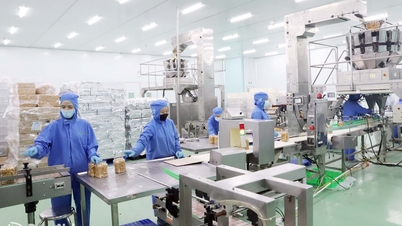




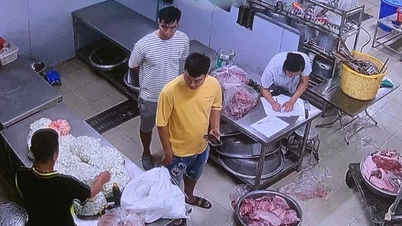






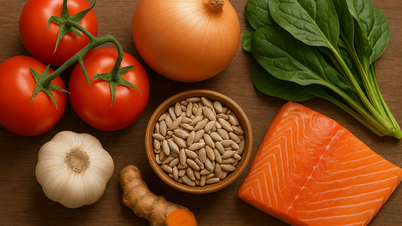



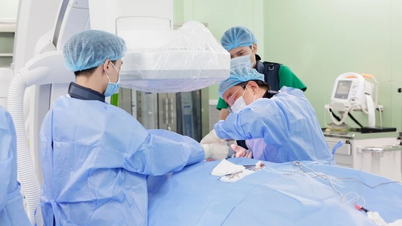







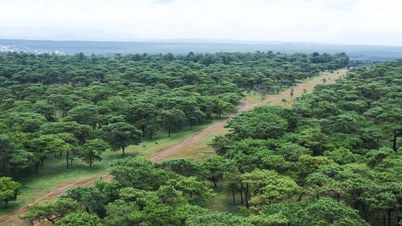

























































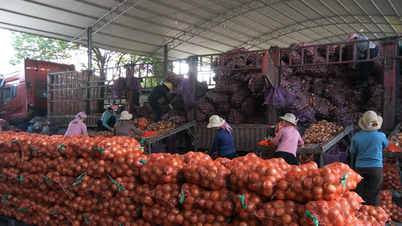




















Comment (0)